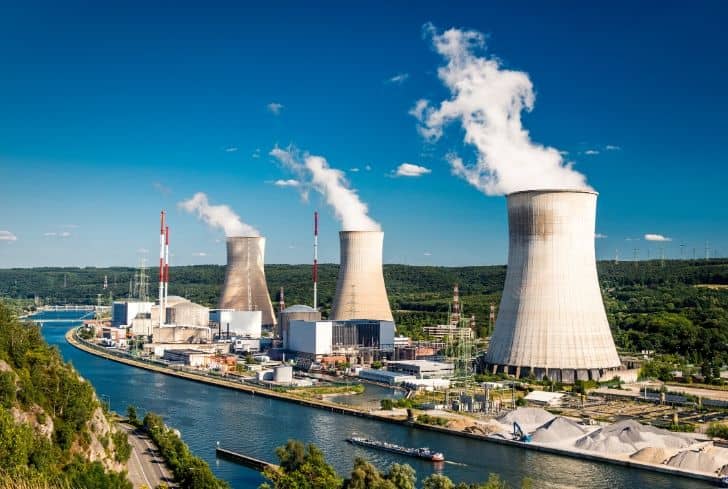Advantages of Nuclear Power
Nuclear power has emerged as a significant source of energy in recent years, offering numerous advantages over traditional forms of power generation. In this article, we will explore the various advantages of nuclear power and its potential to surpass other sources of energy. With its efficient and sustainable nature, nuclear power can meet global energy demands while minimizing environmental impact.
Reliable and Continuous Power Generation
Nuclear power plants operate continuously, providing a reliable source of electricity. Unlike renewable energy sources such as solar or wind, nuclear power is not dependent on weather conditions. This ensures a consistent power supply, reducing the risk of blackouts and meeting the demands of a growing population.
Low Greenhouse Gas Emissions
One of the most significant advantages of nuclear power is its low greenhouse gas emissions. Nuclear reactors produce electricity without burning fossil fuels, which helps to mitigate the impact of climate change. By replacing coal-fired power plants with nuclear reactors, we can significantly reduce carbon dioxide emissions and combat global warming.
High Energy Density
Nuclear power has a high energy density, meaning it can generate large amounts of electricity from a small amount of fuel. This makes it a highly efficient source of energy, especially when compared to traditional fossil fuels. The compact nature of nuclear power plants allows for significant power generation without occupying vast areas of land.
Energy Independence
By investing in nuclear power, countries can reduce their reliance on imported energy sources. Nuclear power plants can provide a stable and self-sufficient energy supply, reducing vulnerability to fluctuations in fuel prices and geopolitical tensions. Energy independence is crucial for ensuring long-term economic stability and security.
Job Creation and Economic Growth
The nuclear power industry creates a significant number of jobs in various sectors, including construction, operation, and maintenance. The establishment of nuclear power plants stimulates economic growth, attracting investments and fostering technological advancements. Additionally, the industry supports a range of related services and industries, further contributing to job creation and economic prosperity.
Advanced Safety Measures
Modern nuclear power plants are equipped with advanced safety measures to ensure the protection of workers, the public, and the environment. Stringent regulations and comprehensive safety protocols are in place to prevent accidents and mitigate potential risks. The industry continuously invests in research and development to enhance safety measures, making nuclear power one of the safest forms of energy generation.
Long-Term Sustainability
Nuclear power has the potential to meet long-term energy demands without depleting natural resources. Uranium, the primary fuel used in nuclear reactors, is available in abundant quantities. Moreover, advancements in nuclear technology, such as breeder reactors, can maximize fuel utilization and reduce waste generation. With proper waste management strategies in place, nuclear power can be a sustainable energy solution.

In conclusion, nuclear power offers numerous advantages that make it a compelling option for meeting global energy needs. Its reliable and continuous power generation, low greenhouse gas emissions, high energy density, and potential for energy independence contribute to its appeal. The industry’s commitment to safety, job creation, economic growth, and long-term sustainability further solidifies its position as a viable and advantageous energy source. By harnessing the potential of nuclear power, we can pave the way for a cleaner, more sustainable future.
Frequently Asked Questions (FAQs) about the Advantages of Nuclear Power
1. What are the advantages of nuclear power?
Nuclear power offers several advantages such as:
Low greenhouse gas emissions
Reliable source of energy
High energy density
Continuous power production
Reduced dependence on fossil fuels
2. How does nuclear power help in reducing greenhouse gas emissions?
Nuclear power plants do not emit carbon dioxide or other greenhouse gases during electricity generation, unlike fossil fuel-based power plants. This makes nuclear power a clean energy source that helps combat climate change.
3. Why is nuclear power considered a reliable source of energy?
Nuclear power plants have a high capacity factor, meaning they can operate at maximum power for extended periods. This reliability ensures a consistent and stable supply of electricity, reducing the risk of blackouts or shortages.
4. What is meant by the high energy density of nuclear power?
Nuclear power has a high energy density, which means a small amount of nuclear fuel can produce a large amount of energy. This compactness allows for efficient energy production and reduces the need for large-scale fuel storage.
5. How does nuclear power ensure continuous power production?
Nuclear power plants can operate continuously for long periods without interruptions for fuel replenishment. This feature enables them to provide a constant and reliable supply of electricity, essential for meeting the demands of modern societies.
6. How does nuclear power reduce dependence on fossil fuels?
By generating electricity without burning fossil fuels, nuclear power helps reduce the reliance on coal, oil, and natural gas. This diversification of energy sources contributes to energy security and mitigates the environmental impact of fossil fuel extraction and combustion.
7. Are there any economic advantages associated with nuclear power?
Yes, nuclear power plants have long operational lifetimes, which allows for stable electricity prices over the years. Furthermore, the cost of nuclear fuel is relatively low compared to the cost of fossil fuels, making it an economically attractive option for power generation.
8. Does nuclear power contribute to job creation?
Absolutely. The nuclear power industry creates a significant number of jobs in various sectors, including engineering, construction, operation, maintenance, and research. These job opportunities help stimulate local economies and support skilled labor.
9. Can nuclear power help in reducing air pollution?
Yes, nuclear power plants do not release pollutants like sulfur dioxide, nitrogen oxides, or particulate matter into the atmosphere, which are major contributors to air pollution. By using nuclear power, we can improve air quality and protect public health.
10. Is nuclear power a safe form of energy?
While no energy source is entirely risk-free, nuclear power has stringent safety measures in place to prevent accidents and protect workers and the public. The industry continuously improves safety standards, and incidents like Chornobyl and Fukushima are exceptional and rare.
11. Does nuclear power contribute to energy independence?
Yes, nuclear power reduces dependence on imported fossil fuels, enhancing energy independence for countries. By relying on domestically produced nuclear energy, nations can strengthen their energy security and reduce vulnerability to geopolitical tensions or supply disruptions.
12. Can nuclear power help meet the increasing energy demands?
Yes, nuclear power is a scalable energy source that can generate large amounts of electricity to meet the growing energy demands of expanding populations and industries. It provides a reliable and sustainable option for meeting future energy needs.
13. Are there any technological advancements in the nuclear power sector?
Absolutely. The nuclear power industry continually invests in research and development to enhance safety, increase efficiency, and reduce waste. Advancements in reactor designs, fuel technologies, and waste management contribute to the overall improvement of nuclear power.




